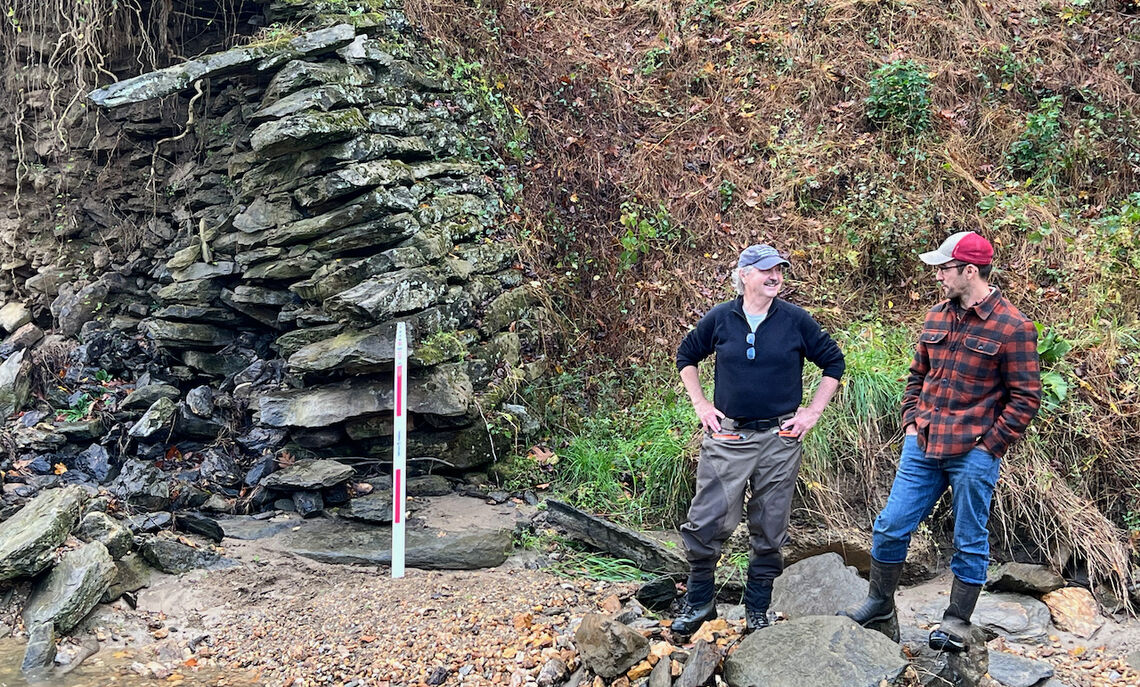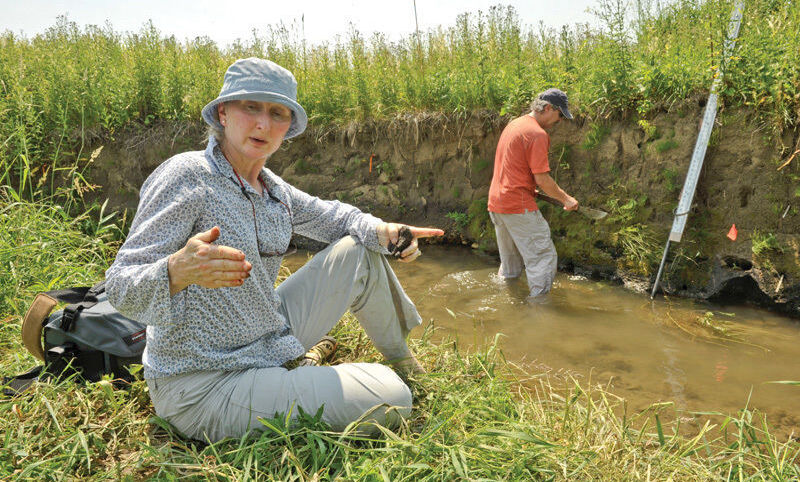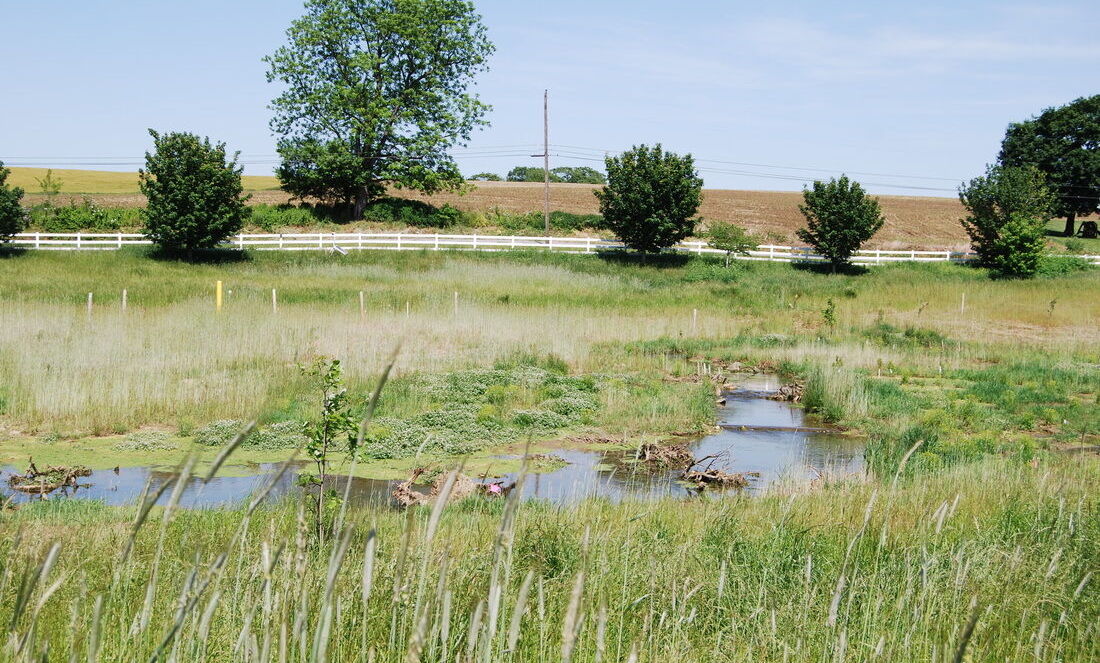F&M Stories
F&M Launches Chesapeake Watershed Initiative
A profound discovery concerning sediments and streams in the Chesapeake Bay Watershed, made nearly 20 years ago by two Franklin & Marshall geosciences professors, drew national media attention at the time and changed the way science views land use and water quality.
However, in recent years, Robert Walter’s and Dorothy Merritts’ research has combined with the work of F&M Assistant Professor of Economics and Public Policy Patrick Fleming for targeted and cost-effective restoration practices. Their work is designed to improve water quality, reduce flooding, and enhance restoration activities in local streams and the Chesapeake Bay.
This collaboration has today led to the newly established Chesapeake Watershed Initiative (CWI) at Franklin & Marshall College, supported through a three-year, $1.25-million grant from the Richard King Mellon Foundation, a Pittsburgh philanthropy.
The initiative’s overarching goal is to achieve significant, far-reaching outcomes for stewardship and restoration in the vast watershed, through applied research and knowledge generation, education, and outreach. The Chesapeake’s watershed spans six Mid-Atlantic states and Washington, D.C., and covers more than 64,000 square miles.
Directed by Walter, Merritts and Fleming, the Chesapeake Watershed Initiative will involve local nonprofit and private organizations, federal and state regulatory agencies, research institutions, and community groups as well as college and high school students.
“We intend for new stream restorations to be initiated by regionwide mapping and outreach,” Merritts said. “With our twofold focus on pollution hotspots within sub-watersheds and proposed dam removal sites, we see our effort as the best opportunity to improve water quality for the region, and at a time that is critical for achieving Chesapeake Bay restoration goals.”
Walter '75 said their efforts “will show what is possible in other regional catchments and sub-watersheds, and—with outreach and information-sharing—transform policies and practices for stream restoration and dam removal in the Bay watershed.”
For policymakers and regional communities, “Our outreach strategies are tailored to increase both landowner and regulatory agency awareness of a science-based, targeted approach to restoration, including monitoring water quality and watershed health outcomes. This approach fosters improvement of practices, policies, and outreach strategies over time,” Fleming said.
Education is another major component of the CWI. An F&M certificate program in watershed science, economics and policy will seed grants of $5,000 to $20,000 to other researchers in the region. With student research assistants, CWI will foster an inclusive community of collaborators engaged in watershed stewardship.
“We think the certificate program is valuable because so many of our students are graduating and going on to careers in environmental restoration,” Merritts said. “The courses would all be upper level and across multiple majors.”
Walter said the seed grants “will be available to F&M faculty and researchers at other regional institutions, broadening the range of collaboration for the full scope of CWI’s activities.”
The purpose of community outreach and inclusion is to increase awareness of the benefits of improved water quality and watershed health for the region, Fleming said.
“River and stream corridors in south-central Pennsylvania have long been degraded, leading many residents (both urban and rural) to be disconnected from local aquatic ecosystems, which are often seen as places that are dirty, unpleasant and best avoided,” Fleming said. “A long-term vision of our work is to transform regional perceptions about the role of aquatic ecosystems in the community, making them places of gathering, enjoyment, and health.”
Included in the collaboration are students from high schools in low-income areas, urban and rural residents, and underrepresented groups who are most affected by degraded waterways.
Conservation is an important focus of the Richard King Mellon Foundation’s philanthropy. Since its founding, the Foundation has helped to conserve more than 4.5 million acres of environmentally precious land, an area larger than the state of Connecticut, and it is the only private foundation to have conserved land in all 50 states.
“As part of its new strategic plan, the Richard King Mellon Foundation is investing in programs that bring high-quality research and data to watershed stewardship in key landscapes, including the Susquehanna River and Chesapeake Bay,” said Sam Reiman ’02, director of the Foundation. “Franklin and Marshall is recognized for its commitment to sound ecological science, community engagement and creating the next generation of environmental researchers and leaders. This grant will help the College build on those strengths.”
In the global effort to achieve strong water quality in the Bay, Walter’s and Merritts’ research convinced the scientific community that valley bottoms in the eastern United States had been completely altered and transformed by hundreds of years of sediment.
Related Articles
November 5, 2025
‘Keep Exploring:’ Scientist Elizabeth Eide ’88 Shares Advice with Students
Elizabeth Eide ’88 spoke with students about her role as executive director for the Center for Health, People, and Places at the National Academies of Sciences, Engineering, and Medicine.
September 29, 2025
Students Make Waves as Susquehanna River Watchdogs
Roselyn Ovalles ’26 and Grace Uwezukwe ’26 spent the summer monitoring the Susquehanna River and its many local tributaries as interns with the Lower Susquehanna Riverkeeper Association.
August 21, 2025
Darij Kulchyckyj ’24 Maps Blueprint for Success
Darij Kulchyckyj ’24 wanted to merge his passions for math, music and the environment. F&M’s liberal arts approach helped him do just that. Now an environmental consultant at an engineering firm, Kulchyckyj also hit a major milestone in his music career thanks to a grant from F&M.




